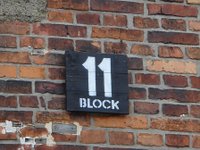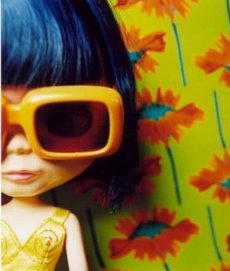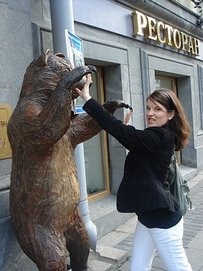 While in Poland, I had the chance to tour Auschwitz & Birkenau (also known as Auschwitz II) -- the most notorious of Nazi death camps. Both camps are located in the town of Oswiecim, about an hour drive from Krakow.
While in Poland, I had the chance to tour Auschwitz & Birkenau (also known as Auschwitz II) -- the most notorious of Nazi death camps. Both camps are located in the town of Oswiecim, about an hour drive from Krakow.When you look at a map, you see why Auschwitz was chosen as the heart of the “final solution” – it was a central location in Europe where Hitler could conveniently and systematically deport victims from all corners of Europe – specifically, from the Nazi-created Jewish ghettos that stretched across the continent. Hitler crafted a complex transport network for the exclusive purpose of sending innocent people to be murdered. Some had to purchase their own tickets.
Auschwitz grew to encompass three large camps and 40 sub-camps -- all put in place mainly for the purpose of exterminating as many Jews as possible. The overall number of victims of Auschwitz in the years 1940-1945 is estimated at between 1,100,000 and 1,500,000 people. The majority of them were Jews who began arriving in 1942. Most of them were murdered immediately upon arrival in the gas chambers. Those who were spared were handed over for slave labour….and many still died of starvation, illness, disease or execution.
Though they were the vast majority, Jews weren’t the only victims – prior to 1942, Auschwitz I was primarily a prison camp for Poles (about 140,000), Gypsies (about 20,000, mostly from Russia), and POWs from across Europe (20,000).
For more background and information about Auschwitz and its history, you can visit the website of the Auschwitz memorial and museum at www.auschwitz-muzeum.oswiecim.pl. It’s a very poignant website and worth a look.
Our visit lasted most the day and was an extremely heavy experience, to say the least.
We started by watching a short film featuring footage taken at the time of the camp’s liberation in 1945.
Next, we toured the main camp, Auschwitz I, which took about 3 hours. Here we saw several prisoners’ quarters which now house powerful displays with remnants from the camp and photos. Many of these rooms were so emotionally overwhelming that it was hard to stay inside for too long -- there is still a palpable, human energy that is ever-present indoors and out. Like any place with a history of such dense humanity (and inhumanity), the residue of what transpired can not be erased...maybe the people are gone, but their souls leave something behind, making me think a little harder and make a connection with the reality of the human toll.
It can be difficult to grasp the quantity of people who were imprisoned and killed at Auschwitz, but when I saw the vast glass display cases filled with piles of items that had been confiscated from prisoners, it was an instant visual quantification of just how many lives were hanging in the balance. It was perhaps the most overwhelming part for me. There were thousands of suitcases belonging to people who thought there was a reason to pack. There were unsettling piles of human hair, some with braids still intact (the hair from murdered female prisoners was cut and sent to German textile factories to make fabric used for military uniforms, etc.). There were large tangles of wire-rimmed eye glasses. There were thousands upon thousands upon thousands of shoes (you can see the variety of prisoner origins by all the shoes…there were a pair of wooden shoes that really stood out, not to mention the case of children’s shoes.) There was a large case of prosthetics and aids for the disabled that had been taken…artificial limbs, crutches, canes, wheelchairs. There was also a tractor trailer’s worth of pots and pans -- prisoners were told they were simply being moved to set up homes in another place, so they brought their most needed possessions, such as cookware. There were also cases of Jewish prayer shawls that had been taken, samples of prisoner uniforms (which were certainly not substantial against Poland’s frigid weather), and a selection of many other personal mementos stripped from victims.
A particularly staggering statistic is that 200,000 children came through the gates of Auschwitz, but only 600 came out. And the majority of them were spared only to be the subjects of cruel and inhumane medical experiments. These children were stripped of their names and given numbers. Adult prisoners were also subjected to these medical experiments as well.
We walked through the dark and dreadful basement passageways of Block 11, which is where the worst forms of torture took place, as well as many prisoner executions. There is a firing wall that was rebuilt outside in the courtyard between Blocks 10 and 11 as a memorial. By the end of this part of the tour, the group was completely silent, no one could utter a word.
The last stop at Auschwitz I was inside a gas chamber and crematorium.
Next, we took a shuttle bus to the camp of Birkenau (Auschwitz II), about a mile away and much bigger than Auschwitz I. This was literally “the end of the line” for most that arrived. Empty train tracks still run through the main brick gate, leading down a stretch of long, (now) green field and ending at the ruins of two massive gas chambers and crematoriums. On one side of the tracks still stand the chimneys of what used to be soldiers quarters (the Nazis tried to blow up the camp upon leaving to hide their crimes, but the chimneys still stand, as well as the ruins of the gas chambers), and on the other side are the buildings where prisoners lived. We went inside one of them and it was truly gut-wrenching. Up to 700 people were crammed into a space not fit for animals – a space permeated by cold, filth, mud, wetness and disease. And these structures are just meters away from the gas chambers and crematoriums where crowds of people walked to their deaths every day. A massive memorial has been constructed at the end of the train tracks, in the space between the two gas chamber ruins.
I know this has been more than enough detail for most, but it’s what I saw and it’s important for me to recount it and share it. It’s the reality of a situation no one should forget.
I was really impressed with the tour guides – ours was very direct and matter-of-fact, not putting any spin or bias on the facts she was giving or the stories she was telling. And it should be told for the horrendous and gruesome thing it was, it does no one any service by lessening the magnitude and evil of all that occurred there. There were a lot of stories and facts that our guide repeated over and over and over again. At one point I wondered if that was on purpose or completely necessary…but I sure didn’t forget anything she said.
So, back to why faith matters. Perhaps it’s a no-brainer. But put in the most simple and human of contexts, I couldn’t help but imagine being sent to Auschwitz myself, at any age or time, with my family (or perhaps being separated from them). I imagined my mom, dad, sister, baby nieces, grandmother -- everyone I love being rounded up and sent there. I thought about all our earthly possessions being taken from us and no attention being paid to any sickness, injuries or problems any of us may have had. I thought about not being able to help or save or do anything – to have the power taken away from me to take care of and protect those I love. I thought about watching people die around me every day -- or surviving, but in the very worst of conditions and circumstances. It’s obviously a grim and horrible thought, I know (maybe there is something wrong with me) -- but I couldn’t help it, I couldn’t stop thinking about it and making it personal. I was thinking about it constantly during the tour, trying not to burst out crying as I conjured up horrible images of the things I was hearing happening to members of my family. But I think people need to think of it in these personal terms sometimes, maybe so that we can remember that everyone is human and so that we will NEVER be part of supporting anything like it or turning a blind eye to it.
Of course, I say this knowing all too well that there are still very similar and horrific genocides still happening in our world. Between April and June 1994, an estimated 800,000 Rwandans were killed in the space of 100 days. There was Bosnia. And the Sudan. And Sierra Leone. I now spend a lot of time thinking about these things too, as they represent the same unfathomable loss, sadness and evil as the Holocaust. I try and figure out what I might be able to do to help. But just the simple awareness is so important, because many people in the world are just not even aware, or choose not to be.
But back to the point (I think) I’m trying to make here. When everything is taken from you and you have nothing, not even the most basic things and abilities we take for granted every day and you are at the mercy of others with dark hearts -- what do you do? There is only one thing you have left, and that's your faith. In God (however you define/name God). I hear people say in bad situations (or in reference to atrocities like the Holocaust) that they have given up on God and stopped believing, because how could there be a God who would let these things happen? But I don’t believe it is God who does these things or allows them to happen. It is human doing. I believe God operates in various ways in the human realm, but humans have been given the ability to govern ourselves, which means deciding if we help or hurt the people around us. The way I saw it as I walked the fields of Auschwitz, thank God the prisoners/victims had their faith (or at least I hope they had it, despite the fact it's what put them there), because it was the one thing that could not be taken away from them, no matter what. It was the only thing that could likely provide any peace or assurance or bit of solace they could take comfort in, even if it had to be kept to themselves in their heads and hearts. Faith is the one thing that lasts forever, long after everything else is gone. Without their faith, they would truly have had nothing to hold onto. Any one of us can have everything taken from us at any time, under any number of circumstances out of our control. And while we certainly do not need to dwell on this or fret it every day, it is more important to me than ever now to make sure that I always have my faith (kind of like an American Express card..."don't leave home without it.") And my visit to Auschwitz has made me want to strengthen it and figure it out and make it a truly meaningful part of my life. Faith, in whatever form, is everything. Auschwitz made that crystal clear to me. The parameters, definition and rules of it no one person or religion or church can define. But having it is absolutely essential. It was the Nazis who lost, full stop -- certainly not the Jews, because their faith still lives on. And thank God for that a million times over. That in itself makes me hopeful and even more faithful. I may sounds like a fanatic, or just plain naive and cliche. But this is what I take away from my visit, and I'll never forget it.
***
The promotions for the movie “The Motorcycle Diaries” featured a tagline that said “Let the world change you and you can change the world” (it is a great movie – I recommend renting it if you haven’t seen it already). It is a line that has stuck in my head, especially over the past 8 months seeing so many new things. I truly feel so blessed and grateful for the opportunities I have been afforded (throughout my life) to see different parts of the world and meet so many different types of people. And the more I see, the hungrier I am for more. So, I quite willingly let the world change me -- and on the journey, with a little (or maybe a lot) of faith, I hope that I can give it something back in return. Not quite sure what that it yet, but I’m sure I will figure it out.
Now I will rush to get my next post up so that we can get back to happier subjects... :)
 The chimneys that remain from soldier housing at Birkenau
The chimneys that remain from soldier housing at Birkenau

 Shoes from victims
Shoes from victims







No comments:
Post a Comment